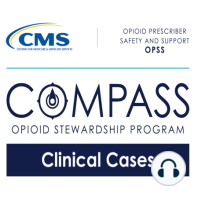17 min listen

Episode 1: Assuming Care for a New Patient on Chronic Opioid Therapy (COT): Meeting a Patient’s and Society’s Needs
Episode 1: Assuming Care for a New Patient on Chronic Opioid Therapy (COT): Meeting a Patient’s and Society’s Needs
ratings:
Length:
20 minutes
Released:
Apr 11, 2022
Format:
Podcast episode
Description
In this episode, Dr. Stader meets Anne, a chronic pain patient new to his practice and they review her medical history. Following their encounter, Don and Rachael discuss the lack of longterm efficacy of opioids for pain management and their safety risks. Show Notes: Opioid Risks and Side Effects The Iowa Healthcare Collaborative presents the Compass Opioid Stewardship Clinical Cases podcast in partnership with the Centers for Medicare and Medicaid Services. Visit their website for more information on the Compass Opioid Stewardship Program.
Released:
Apr 11, 2022
Format:
Podcast episode
Titles in the series (31)
Episode 10: Cross Titration to Buprenorphine for Chronic Pain: In this episode, Dr. Stader introduces buprenorphine as a possible agent to help manage Anne's chronic pain. Following their encounter, Don and Rachael discuss the use of buprenorphine for chronic pain and how to effectively cross titrate a patient... by Compass Opioid Stewardship Clinical Cases